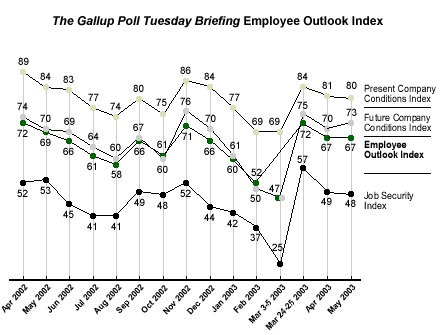Right now, everyone from the average investor to the nation's top economic policy-makers is looking for signs that the much-anticipated post-war economic recovery is taking hold. Wall Street has largely dismissed April's relatively weak economic data as war-related. But key economic measures, such as Friday's May unemployment data, will be seen as clear indications of post-war economic trends.
Will May's unemployment data suggest that the jobs recession is finally coming to an end? Not if it is consistent with Gallup's latest reading of employee sentiment. The Gallup Poll Tuesday Briefing Employee Outlook Index* for May is unchanged, showing no sign that the jobs recession is ending. This is not good news for those looking for an upward surge in economic activity following the war, and terrible news for the millions of Americans currently looking for new jobs.
Employee Confidence Is Unchanged
The Employee Outlook Index remained static at 67 in May. When measured March 3-5, prior to the start of the war with Iraq, employee confidence hit a new low of 47. On March 24-25, after the war had begun, the Index surged to 72, matching its highest point since its inception a year ago. In April, employee confidence eased as the Index declined to 67, essentially equaling its December 2002 level of 66. Currently, the Index remains below its May 2002 level of 69.
In May, the three individual dimensions making up the Employee Outlook Index also showed little change:
- The Present Company Conditions Index remained essentially unchanged at 80 in May, after an April reading of 81. This figure had fallen to 69 in early March, but surged upward to 84 in late March following the start of the war. However, employees' confidence in the present conditions at their companies declined in April, and currently remains below its level from a year ago (84).
- The Future Company Conditions Index showed a slight uptick in May, increasing to 73 from its April level of 70. This dimension of the Index -- which measures employee expectations concerning the prospects of their companies -- after hitting a new low at 47 in early March, it soared to 75 following the beginning of the war, essentially equaling its November high of 76. However, the Future Company Conditions Index eased in April to 70. The May increase means employee expectations for their companies are slightly better than they were a year ago.
- The Job Security Index remained essentially unchanged in May, at 48. It had been plummeting prior to the war, and bottomed out at a new low of 25 in early March. Like the other two dimensions, the Job Security Index surged upward in early March and reached 57 in late March. In April, this dimension fell eight points to 49. Employees' confidence in their job security is now below where it was a year ago (53).

Where's the Recovery?
The Employee Outlook Index further confirms what we are hearing from the public in general: there has been no surge in consumer or employee confidence following the war. Employees, like the general public, have not seen a post-war improvement in current economic conditions nor in the job market. Those pointing to an upturn in consumer confidence are putting a great deal of weight on a relatively modest increase in consumer hopes and expectations for the months ahead.
Given the way potential job seekers are entering and leaving the job market, it is very hard to predict this Friday's unemployment figures. Regardless, Gallup's employee outlook data suggest that the post-war recovery is yet to be seen. Until evidence of such a recovery begins to turn up in employee and consumer feedback, there is little reason to expect much improvement in the job outlook.
*Results are based on telephone interviews with 702 adults who are employed with non-governmental, for-profit companies having five or more employees, aged 18 and older, conducted May 5-7, 2003, and May 19-21, 2003. For results based on the total sample, one can say with 95% confidence that the maximum margin of sampling error is ±4%.

